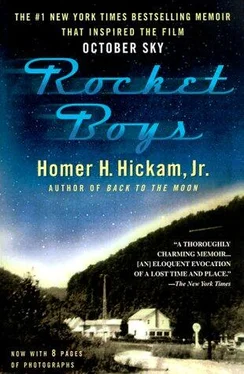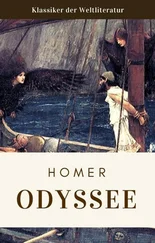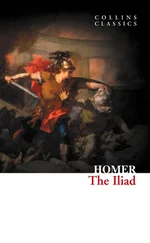When Mom came home, she found our bikes parked neatly beside each other in the backyard and Jim and I sitting innocently together in the living room. Jim had his hand on his head, idly cradling it while he read the sports page of the Welch Daily News . I was sitting nearby, watching television, trying not to scream from the pain each time I breathed. My ribs ached for a month. The dining-room chair was back in its place, well-glued. Jim and I watched it for days to keep anyone from sitting on it until it dried. The dogs got the blame for the screen door. Either Mom never noticed it or chose not to mention the dent in her pot.
Jim was already at the bus stop while I was still rushing around getting ready. I was in and out of the bathroom in two minutes flat, pausing only to brush my teeth and run a wet hand through my hair. I had my mother’s hair—black, thick, and curly. She had started turning gray in her thirties, so I knew that was likely to happen to me too. It didn’t look like I’d gotten anything from Dad’s family tree. Mom said I was a Lavender like her through and through. Dad never argued with her about it, so I guessed it was so. That was fine with me. The Hickams always seemed a nervous bunch to me. Dad and his brother Clarence and sister Bennie never seemed able to quite settle down, always jumping up to walk real fast to wherever they were going, and talking fast too. The Lavenders were a more relaxed bunch, although Mom’s father, my “Ground-Daddy,” was shot in the arm crawling into some lady’s bedroom while her husband was supposed to be working the hoot-owl shift over in Gary. My mom said her mama helped her daddy put his coat on while his winged arm healed. Mom also said Ground-Daddy would have gone naked out in the snow before she would’ve helped him.
On the first school day after Sputnik , I threw on one of Jim’s hand-me-down cotton jackets, grabbed my books off the banister, and snatched the brown-bag lunch Mom held out for me at the front door. I had to run for it. The big yellow bus was already at the stop in front of the Todds’ house, and Jack Martin, the driver, waited for no one. He watched sourly, an unlit cigar clamped between his teeth, as I scrambled aboard an inch ahead of the closing doors. “Any later and you’d be walking, Sonny boy,” he said. I knew he wasn’t kidding. Jack ran his bus in dictatorial fashion. The slightest breach in decorum would find the perpetrator kicked off on the side of the road, no matter where we were. I found a two-inch sliver of a seat on a bench and squeezed in beside Linda DeHaven and Margie Jones, girls who had been in my class since the first grade. They shifted minutely and fell back asleep. Jack changed gears and we were off. My friend and fellow former Coalhican O’Dell was snoozing up front, just behind Jack. O’Dell was small and excitable. His hair was the pale, nearly translucent color of spun silk. In the seat behind him, Sherman, a compact, muscular kid with a wide, intelligent face, was also sleeping. Sherman’s left leg was shriveled and weak, the result of polio. During all our years growing up together, he never complained about his affliction and I never gave it any mind. He either kept up with the rest of us or he didn’t.
Roy Lee, thin and long-legged, got on the bus at the next stop, easing down the aisle until he squeezed in behind me. For as long as I could remember, Roy Lee and I had been friends. He’d show up at my house or I’d go up to his and we’d be off to the mountains, playing cowboys or spacemen or pirates or whatever we could think up. Roy Lee was unique among us. He had his own car, the result of an insurance settlement after his father had died in the mine. His mother, wanting to keep Roy Lee in Coalwood, had campaigned to keep her company house. Surprisingly, she and Roy Lee had been allowed to stay. Maybe it was because Roy Lee’s brother still worked in the mine. Roy Lee was a good-looking kid, and he knew it. His hair was coal black, and he kept it swept back and greased and teased into what we called a D.A. (duck’s ass). He looked a bit like a very young Elvis. Roy Lee thought he was pretty much girl bait, and I guess he was, seeing as how he had a date nearly every weekend. Owning a car probably helped too.
I was grateful to have Roy Lee, Sherman, and O’Dell as friends. When I entered the first grade, I found myself in a community of boys from all over the town, and it became apparent that, as my father’s son, I was marked by his position. Around the kitchen tables at night, union fathers often identified Homer Hickam as the enemy, and the boys from those families sometimes went out looking for revenge. Jim was always big for his age and known for his terrible temper. I was a much easier target, caught at recess behind the school or loitering around the Big Store. Though I came home bloody, I never told my mother who attacked me, and my father never knew of it at all. Coalwood boys didn’t carry tales on one another. I did the best I could for a small, nearsighted kid and each year got to be a little tougher nut to crack. I even managed to bloody a few noses myself. For some reason, Roy Lee, Sherman, and O’Dell never seemed to mind who my dad was. As far as they were concerned, we were all just Coalwood kids together.
The road out of town led past the coal mine, and Jack blew the bus horn at the tipple. Those of us still awake waved at the men at the man-hoist, and then we kept going for about a mile until we stopped for the few students that came out of the hollow at Six (named after the sixth ventilation shaft sunk for the mine; there were some houses built up around it). They were the last students to pick up. Then we started up the first of the mountains. Between Coalwood and Big Creek High School were eight miles of twisting, potholed roads. Unless it was snowing, it took Jack about forty-five minutes to cover the distance.
The road up Coalwood Mountain turned through one steeply inclined switchback after another. Wedged three to a seat, most of us dozed, leaning against one another at each turn. At the top of the mountain, the road dropped precipitously and swung back and forth until it bottomed out into a long, narrow valley. Here was the longest stretch of straight road in the district, nearly a mile of asphalt. About midway down it, behind a barbed-wire fence, was one of the big fans that ventilated the mine. On Saturday nights, this straight stretch—nicknamed Little Daytona—was a racetrack for those few teenagers with wheels, and the fan a favorite place to park and make out. Since I had neither a driver’s license nor a girlfriend, I knew both those things only by hearsay. Roy Lee was my most likely source. He had told me he took his dates to park there after going to the Dugout. The Dugout was in the basement of the Owl’s Nest restaurant across from the high school, and there were dances there every Saturday night. I’d never been to the Dugout, but from what I’d heard it was a lot of fun. One of the Big Creek janitors, Ed Johnson, was the disc jockey, and Roy Lee said he had one of the best record collections this side of American Bandstand .
After a sharp turn at the end of Little Daytona, we entered the town of Caretta. Caretta was owned by the same company that owned Coalwood. Its tunnels had broken through to our mine the previous year. There had been a massive slab of sandstone between the two mines, and my father had fought through it like he was in a war. Once opened, the combined mines caused so many ventilation problems, Dad had to take over both of them. According to what I heard Mom tell Uncle Joe during a visit, a lot of people in Caretta had said some real nasty things about that, calling Dad “uppity.” There seemed to be so many people who just couldn’t forgive Dad for not having a college degree like the Captain. That seemed strange to me since they didn’t have a degree either. Mom told Uncle Joe that, as far as she was concerned, those Caretta people weren’t “much punkin’ and funny turned too.” Mom sometimes seemed to lapse into a different dialect when one of her brothers was around. I remember Uncle Joe nodding his head in solemn agreement.
Читать дальше
Конец ознакомительного отрывка
Купить книгу












